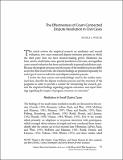| dc.description.abstract |
This article reviews the empirical research on mediation and neutral evaluation, two court-connected dispute resolution processes in which the third party does not have decision-making power. Mediation has been used in small claims cases, general jurisdiction trial cases, and appellate cases; neutral evaluation has been used primarily in general jurisdiction cases. Because the program structure and the nature of the mediation process differ across the three court levels, the research findings are presented separately for each type of court as well as for each dispute resolution process. Wissler reviews the data sources and methodology used in the studies examined here, describes the dispute resolution process and the structure of the programs in order to provide a context for interpreting the research, presents the empirical findings regarding program outcomes, and reports findings regarding the impact of program structure on outcomes. |

